Hezbollah Fires Rockets at Israel After Commander's Assassination
The Iran-backed Lebanese militant group Hezbollah launched
approximately 160 projectiles at Israel on Wednesday in retaliation for the
assassination of one of its top commanders, Taleb Sami Abdullah, the Israel
Defense Forces reported. Abdullah was killed on Tuesday in an Israeli strike on
a house near the Lebanon-Israel border, along with three other Hezbollah
officials.
Since the Hamas attack on Israel on October 7, which
initiated the ongoing conflict in Gaza, Hezbollah and Israeli forces have
engaged in daily exchanges of fire across Israel's northern border with
Lebanon. Hezbollah has declared that its rocket attacks will cease only if a
cease-fire is implemented in Gaza.
In response to the Israeli attack that killed Abdullah, who
oversaw Hezbollah's military operations along the central Lebanon-Israel
border, Hezbollah targeted two Israeli military bases. This incident has
heightened concerns that the Israel-Hamas war might escalate into a broader
regional conflict. Both Hezbollah and Hamas receive substantial support from
Iran and are designated as terrorist organizations by the United States,
Israel, and the European Union.
However, Hezbollah is regarded as a more organized and
better-equipped force compared to Hamas. The conflict has had a severe human
toll. Israeli strikes have resulted in at least 400 deaths in Lebanon,
including 70 non-combatants, since the October 7 Hamas attack. In northern
Israel, 15 soldiers and 10 civilians have been killed by Hezbollah's actions.
The violence has also displaced tens of thousands of people
on both sides of the border. Despite the ongoing hostilities, Hezbollah has
indicated that it does not seek a full-scale war with Israel. Nevertheless, the
scale and intensity of the attacks have increased recently.
Last week, Israeli Prime Minister Benjamin Netanyahu, during
a visit to the border, warned that Israel would deliver an "extremely
powerful" response to continued Hezbollah attacks. Israel has
significantly ramped up its military preparedness, increasing the number of
reservists it can mobilize from 50,000 to around 350,000, as reported by the
Guardian.









.jpg)